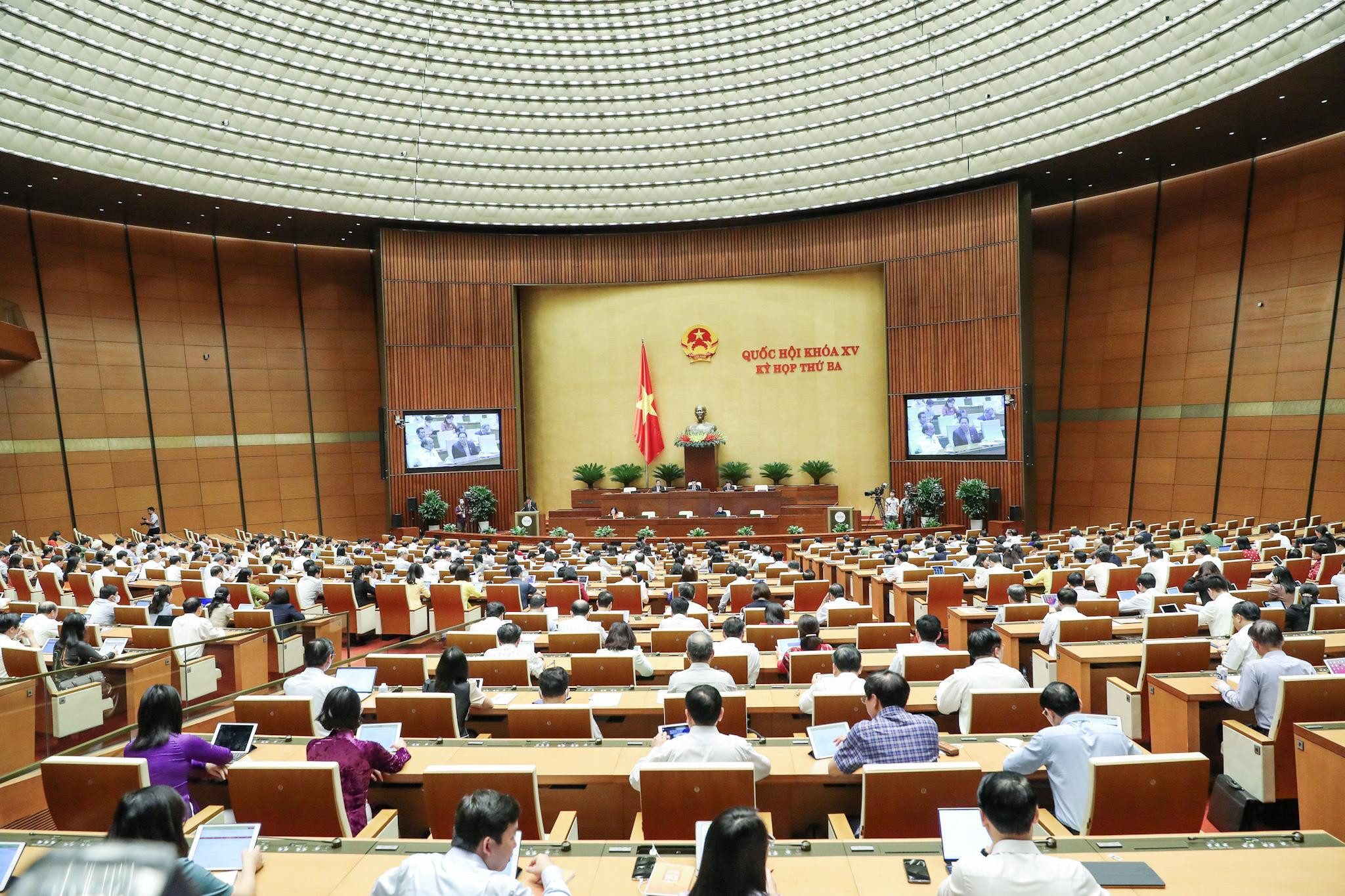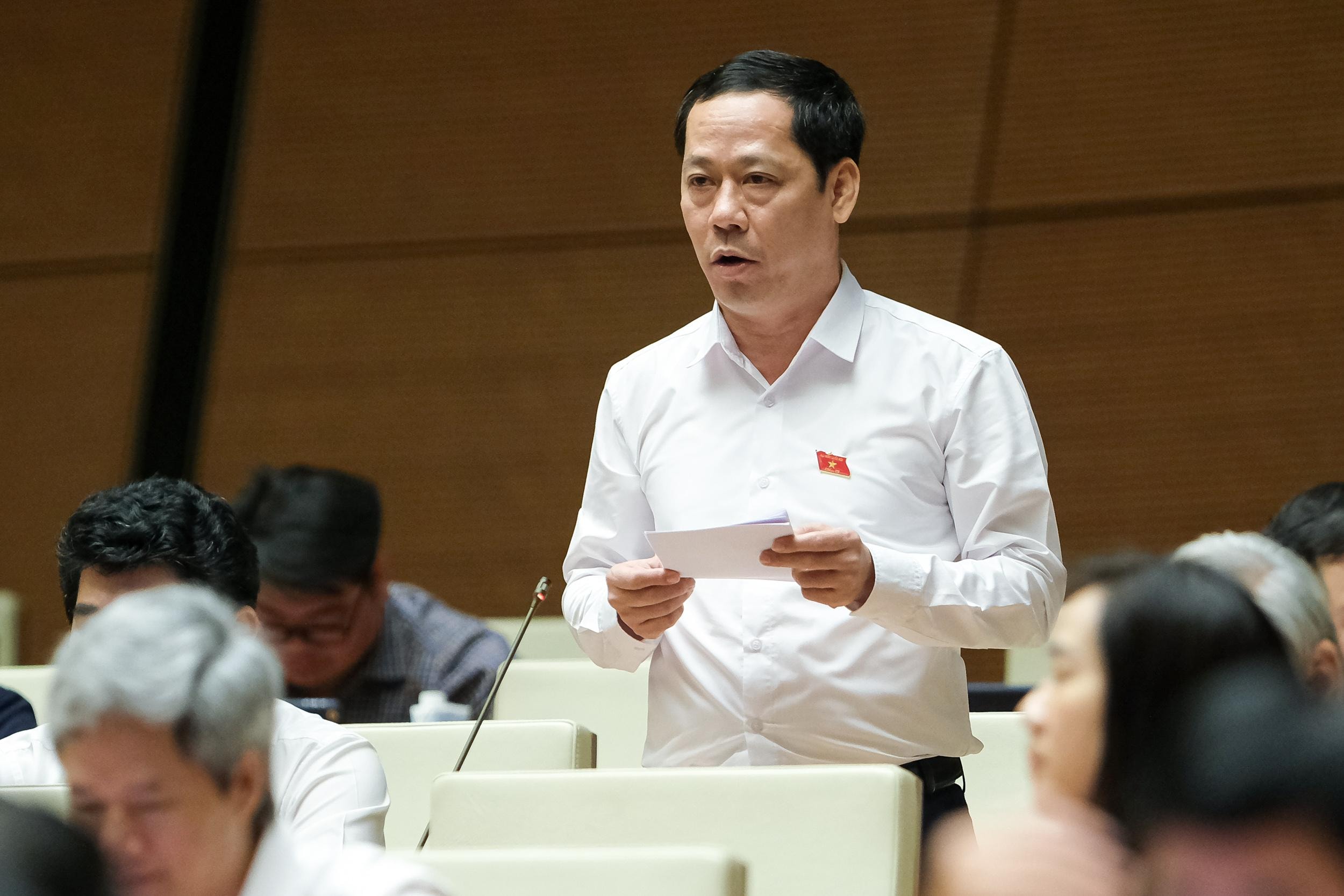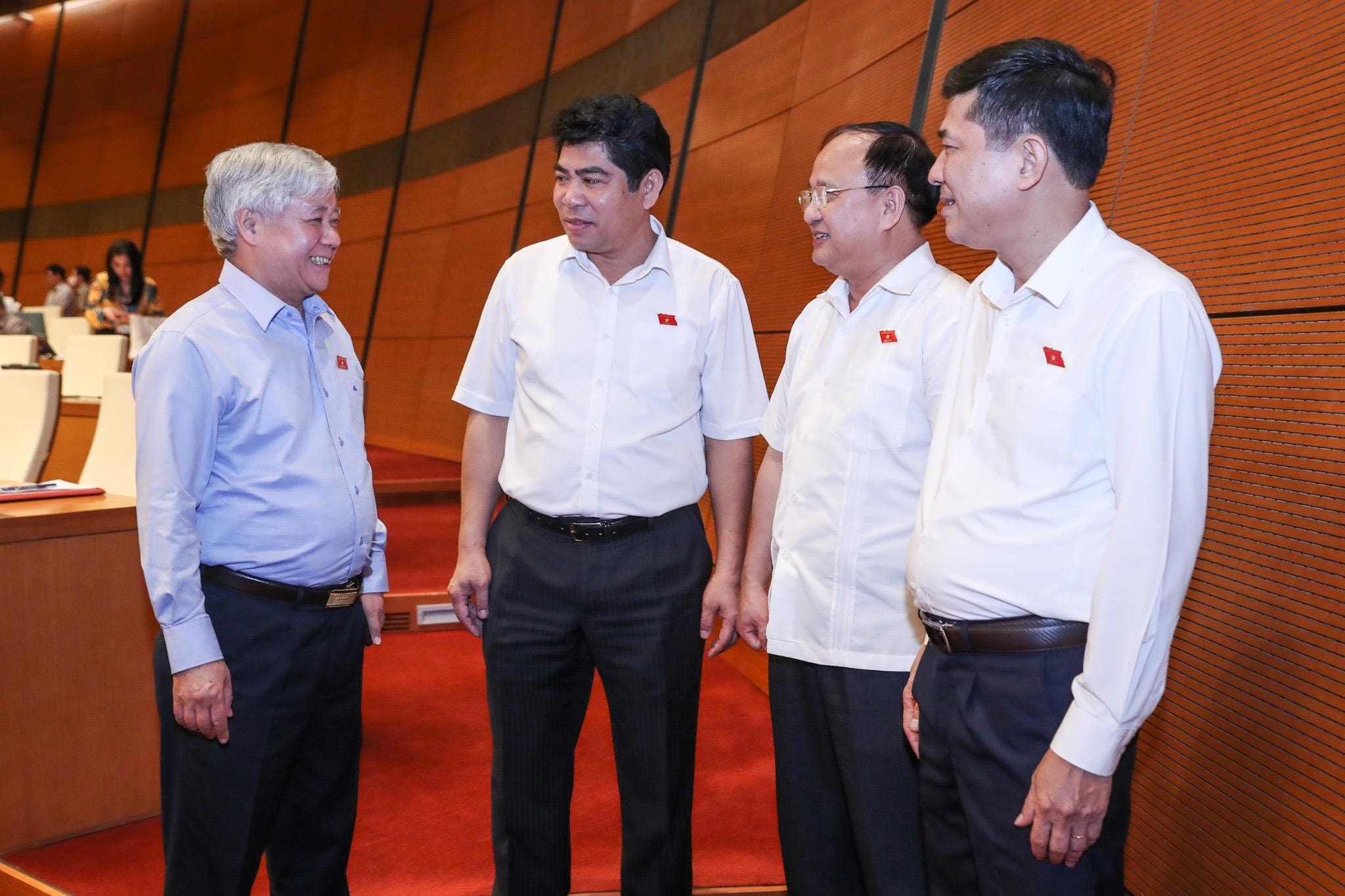National Assembly Delegate of Nghe An: Promoting democracy at the grassroots level requires a clear legal mechanism, avoiding formality.
(Baonghean.vn) - On the morning of June 14, at Dien Hong Hall, National Assembly House, under the direction of Vice Chairman of the National Assembly Nguyen Khac Dinh, the National Assembly discussed in the hall the draft Law on Implementing Democracy at Grassroots Level.
 |
Panorama of the working session on the morning of June 14 at Dien Hong Hall, National Assembly House. Photo: Quang Khanh |
HIGHLIGHT FEASIBILITY AND PRACTICALITY
Speaking at the discussion, he highly agreed with the necessity of promulgating this law. However, regarding the viewpoint of law-making, Mr. Tran Nhat Minh - full-time National Assembly delegate of Nghe An delegation requested the drafting agency to research and develop legal provisions that ensure substance, high feasibility, easy implementation, effectiveness, have clear legal mechanisms, avoid formality, overcome limitations and shortcomings in implementing grassroots democracy, ensuring the goal of "Perfecting the law on implementing democracy at the grassroots level to ensure that State power belongs to the people".
During the process of drafting and submitting the Law project, there were different opinions regarding the provisions on implementing democracy in enterprises in this Law project, including two types of opinions: the first was the proposal that the Law project stipulate a separate chapter on the content and methods of implementing democracy in different types of enterprises, including some specific provisions for state-owned enterprises; the second opinion was the proposal that the Law project not stipulate the implementation of democracy in enterprises. The Government reported and asked for the National Assembly's opinion.
 |
The Presidium chaired the working session. Photo: Quang Khanh |
Regarding this content, delegate Tran Nhat Minh agreed with the first type of opinion. Because according to the delegate from Nghe An, in reality, in recent times, the implementation of democracy in enterprises, especially non-state enterprises, has not been as expected.
The Ministry of Home Affairs' summary report on law enforcement on grassroots democracy implementation also stated: Many non-state enterprises have not yet established democratic regulations; the rate of enterprises with trade unions in the non-state sector and foreign-invested enterprises organizing workers' conferences is still low (about 64%).
Enterprises without trade unions almost do not organize labor conferences according to regulations; the organization of labor conferences in some enterprises is still formal, not ensuring the content according to regulations, especially the disclosure of finances, types of funds, etc.
The reason is that some enterprises and employers have not yet properly recognized the meaning and effect of organizing the implementation of democratic regulations at enterprises, so they have not proactively coordinated, but mainly because the grassroots trade union executive committee proposed it, so implementation still faces difficulties, especially in non-state enterprises.
 |
Mr. Tran Nhat Minh - full-time National Assembly delegate of Nghe An delegation spoke at the discussion on the draft Law on Implementing Democracy at Grassroots Level. Photo: Quochoi.vn |
Some enterprises do not organize to collect opinions of the majority of employees but still sign collective labor agreements; many enterprises have not made public the contents of collective labor agreements, so employees have not had access to the enterprise's collective labor agreements. "The number of enterprises with collective labor agreements is still limited, and the content that is more beneficial to employees is not much," said delegate Tran Nhat Minh.
In addition, according to data from the Vietnam General Confederation of Labor, in 2021 there were 105 labor disputes leading to collective work stoppages, mainly due to the fact that employees did not agree with the salary payment mechanism of the enterprise, many enterprises delayed salaries, bonuses or paid unreasonable salaries and bonuses, the quality of shift meals was not guaranteed or the working hours of employees were increased without consulting the employees...
Most recently, at the Program of the Prime Minister meeting and dialogue with workers in 2022 taking place on the morning of June 12, 2022, in 10 major groups of issues compiled by the Vietnam General Confederation of Labor, which workers nationwide are interested in, recommending and proposing, there is an issue that workers request to strengthen inspection, supervision, and strict handling of violations of the law by employers against workers.
After citing and analyzing, Mr. Tran Nhat Minh commented: "In my opinion, the implementation of democracy in enterprises needs to be given more due attention. It is necessary to research, review and develop legal regulations to promptly overcome limitations and shortcomings in practice and measures to ensure the implementation of democracy in enterprises..."
However, the delegate also requested that the drafting agency continue to review the provisions of labor law such as: business dialogue, collective labor agreements, labor dispute resolution, labor contracts... stipulated in the Labor Code and other sub-law documents to avoid duplication and overlap between the two legal systems on grassroots democracy and labor law.
Regarding the content and methods of implementing democracy in the business sector, the full-time delegate of Nghe An delegation said: it is not necessary to have full regulations like the type of ward, commune, town or agency, unit. Regulations on workers' rights on democracy need to be researched and designed in a more limited, feasible, practical direction, directly related to the rights of workers that need to be protected by law, can be implemented through representative democracy or direct democracy; not affecting the production and business activities of enterprises.
To justify his point of view, delegate Tran Nhat Minh cited the provision that the right to inspect of employees as an independent institution as stipulated in the draft Law is unreasonable, because considering the relationship between employers and employees, employees will have difficulty exercising the right to inspect in practice.
 |
National Assembly delegates from Nghe An discuss on the sidelines of the discussion session. Photo: Quang Khanh |
Furthermore, regarding the form of inspection by employees, the draft Law stipulates through the forms of petitions, complaints and denunciations as prescribed by law, which are also very general, without specifically stipulating which agency or individual has the authority to resolve when employees have requests.
Meanwhile, complaints and denunciations by employees against employers in enterprises are not within the scope of the Law on Complaints and the Law on Denunciation. Therefore, the provisions on forms of employee inspection as in the draft Law are not feasible.
“If there is any, it has more of a “labor dispute” element than a democratic practice, and not only that, it also worsens labor relations more than dialogue, discussion, and exchange to build harmonious and stable labor relations, and does not ensure the principles of “goodwill, cooperation, honesty, equality, openness and transparency” in implementing democracy at enterprises,” delegate Tran Nhat Minh said and further analyzed: while this is a specific and consistent principle, showing the difference between democracy at enterprises and other types of democracy at the grassroots level.
However, regarding the content and methods of implementing democracy in state-owned enterprises, he suggested researching and developing regulations that are more specific than those for non-state enterprises.
ENSURING INDEPENDENCE IN THE ACTIVITIES OF THE PEOPLE'S INSPECTION
Regarding the People's Inspectorate, delegate Tran Nhat Minh agreed to transfer the current regulations regulated by the Law on Inspection to this Law; and at the same time agreed with the Examination Report of the National Assembly's Law Committee on the proposal to study a more suitable option for the name "People's Inspectorate Board" to match the methods of implementing grassroots democracy. According to him, changing the name to Supervisory Board is an option to study.
 |
Minister of Home Affairs Pham Thi Thanh Tra gave an explanation at the discussion session on the draft Law on Implementing Democracy at Grassroots Level after listening to 20 National Assembly deputies' opinions, with 3 National Assembly deputies debating. Photo: Quochoi.vn |
Regarding the authority of the People's Inspectorate, the delegate of Nghe An delegation suggested that the provisions of the 2010 Inspection Law should not be continued, specifically: "When necessary, the Chairman of the People's Committee at the commune level, the head of a State agency, public service unit, or State enterprise shall be assigned to verify certain cases."
Mr. Tran Nhat Minh said that this regulation, on the one hand, has invisibly denied the independence in the activities of the People's Inspectorate, turning this organization into a supporting entity for the subject of supervision and it will be difficult for it to operate objectively when the subject of supervision can assign tasks to the subject with the right to supervise. On the other hand, this regulation is also not consistent with the regulations on the activities of the People's Inspectorate at the commune level and in State agencies, public service units, and State-owned enterprises.
The Draft Law on Implementing Democracy at Grassroots Level submitted to the National Assembly consists of 7 chapters and 74 articles stipulating the content, form, and method of implementing democracy at the grassroots level; the functions, tasks, and powers of the People's Inspectorate and the responsibilities of agencies, units, organizations, and individuals in ensuring the implementation of democracy at the grassroots level.
The scope of “base” is defined as communes, wards, towns and residential communities at the commune level; agencies, public service units of the Party, State, socio-political organizations; enterprises, cooperatives and other organizations that hire and use labor under labor contracts, are places that directly publicize information, organize to collect opinions, implement decisions and are subject to inspection and supervision by citizens, cadres, civil servants, public employees and workers.
